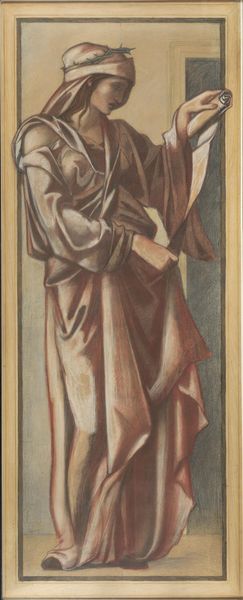
tempera, painting
#
portrait
#
tempera
#
painting
#
figuration
#
oil painting
#
history-painting
#
italian-renaissance
#
early-renaissance
Copyright: Public domain
Editor: Here we have Sassetta's "Saint John the Evangelist," painted in tempera around 1444. The way Saint John's robes are draped is fascinating – they appear almost weightless despite their bulk. What can you tell me about the materials and their significance in this period? Curator: It's tempting to see the divine hand guiding Sassetta's brush, but I'm more interested in how that hand was trained, the pigments ground, and the gold leaf applied. Tempera, ground pigments mixed with egg yolk, demands precision and speed. Its wide usage underscores the prevalent guild system of the time, regulating artistic production and skill transmission across workshops. Editor: So, the materials themselves tell a story about the making process and its historical context. What about the use of gold? Is that purely decorative? Curator: Never purely. The gold, laboriously applied leaf by leaf, shines not just with light, but also reflects the economic power that commissioned this work. Patronage drove the art market. Demand created specific material choices. Think of the social and financial resources needed to depict even an ethereal saint; that gold screams expense and reinforces established hierarchies. Editor: It sounds like the materiality of the art reveals much more than just artistic skill. It sheds light on the systems of power and the labor involved in art production. Curator: Precisely. By understanding the materials, production and circulation of the painting we can question what are considered art and craftsmanship. We examine social dynamics and question the privileged view given to 'fine art'. Editor: It’s really insightful to consider artwork with focus on its components and surrounding environment instead of only symbolism! Thank you! Curator: Indeed. Focusing on materials allows to understand that these paintings weren’t miraculous apparitions of talent but a cultural products embedded in intricate networks of resource and labour.
Comments
No comments
Be the first to comment and join the conversation on the ultimate creative platform.













